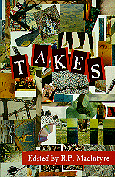


|
Takes.
Edited by R.P. MacIntyre. Subject Headings:
Grade 10 and up / Ages 15 and up. ***1/2 /4
|

excerpt:
Young protagonist fiction should be like good rock and roll - by definition slightly outrageous and raw. At its soul it should bear a relentless rhythm and engage the mind as well as the heart.Leaving aside his arguable definition of rock and roll, editor R.P. MacIntyre has deftly defined the attraction of this short story collection: at its best, the stories - "assembled moments of realization, seen from the keen-eyed edge of youth" - do engage the mind and the heart. The characters provide a lot of material for thought, but, at the same time, emotion-tugging imagery is at the centre of a lot of the stories.
The strongest story in the collection is Helen Mourre's "Things Happen." Through a combination of innocence and careless stupidity, Binny, the story's small town protagonist, is key in getting Sniper - a middle aged hippieish teacher who is popular with students, but unpopular with the school board - fired. The story is classic "coming of age," but it is the casualness of what happens that makes it engrossing. Lives can change abruptly. Things happen. Binny realizes this in the feel and smell of the small town which we know he will have to leave. The innocent are sometimes dangerous; he doesn't want to be young anymore. Mourre handles the ending perfectly as Sniper is leaving town.
Binny is riding his bike downtown the day they pull out. He happens to meet them at the four-way stop. He won't ever forget the way Sniper looks at him that morning. Binny thinks that's the way a guy would look if his life had been folded back and stripped bare ... [Binny] gets this weird, choked-up feeling from some place deep inside he didn't know existed until this moment ... Once in a while he looks up the CN tracks that cut the land in half. He is always fascinated by the way the two lines converge in the distance and come together until gradually there is nothing but the wind, blowing in the brome grass at the edge of the right-of-way.
Another story, "Scarecrow" by Ed Yatscoff, has an obsessed prankster discovering what he, and we, didn't expect from the brooding, scary owner of the coveted scarecrow. This exciting story is a good example of how a "twist" in the story isn't simply a plot convention but a kind of inevitability which makes us think about (and feel) the character's discovery process.
Even better is "The Initiation" by Megan K. Williams. This is the harshest story in the collection, but it is also filled with humanity and aching sadness. A bright girl, trying to fit into a particularly nasty school clique, The Group, realizes she is as much a joke to them as the unfortunate 'plain' girl the others mock. Williams' control of the elements in the story is impressive; again, the twist becomes inevitable and horrible for its desperately lonely narrator, and for the reader.
There's no doubt that MacIntyre can write for a young adult audience - his short story collection The Blue Camero and novel Yuletide Blues are proof of that. In Takes, MacIntyre also demonstrates that he can shrewdly assemble a collection of others' work. He groups the stories carefully and cleverly: two bizarre tales at the start; coming of age ("Things Happen") in the centre of the book; followed by adventure tales; and then the toughest story, "The Initiation," and two poetic tales at the end.
The stories in Takes provide a balance between male and female experience, big city and small town, the strange and the ordinary - which is even stranger. Of course, there is good and bad in any story collection. But here, even the weakest stories, "The Job," for example, are at least inoffensive. Whatever "take" you have on the collection, it is worth close study for students, teachers, and the lucky reader who seeks it out. The cover is striking, too.
Highly Recommended
Rory Runnells is the Director of the Manitoba Association of Playwrights.

To comment on this title or this review, send mail to cm@umanitoba.ca.
Copyright © 1996 the Manitoba Library Association. Reproduction for personal use is permitted only if this copyright notice is maintained. Any other reproduction is prohibited without permission.
Published by
The Manitoba Library Association
ISSN 1201-9364
AUTHORS |
TITLES |
MEDIA REVIEWS |
BOOKSHELF
BACK ISSUES |
SEARCH |
HOME